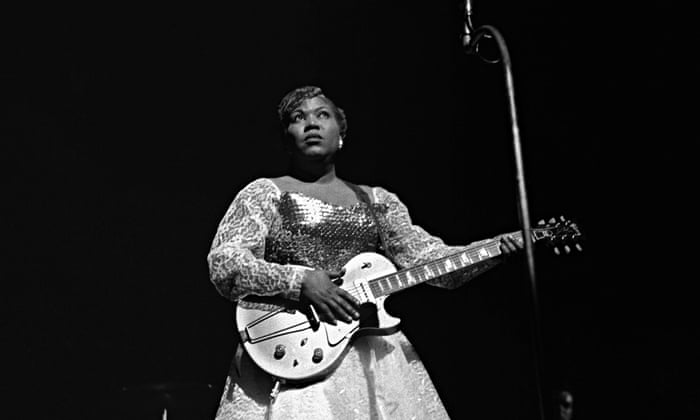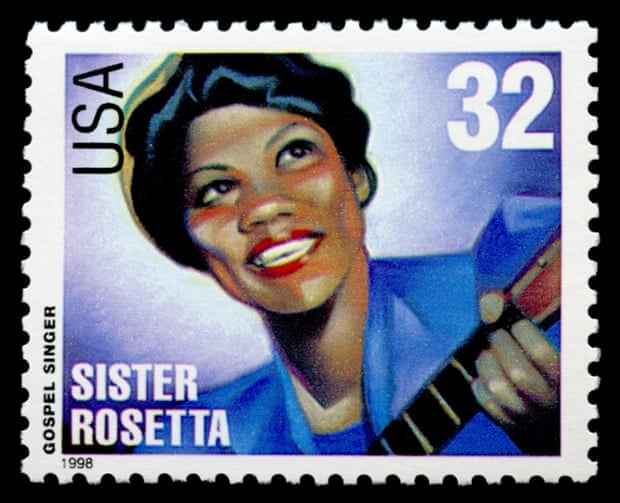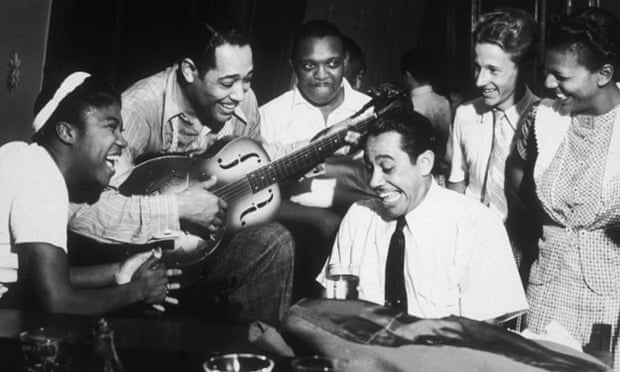Sister Rosetta Tharpe: the godmother of rock’n’roll
She could outplay Chuck. She could outsing Aretha. And she influenced everyone from Elvis to Rod. Richard Williams revisits the songs and sufferings of the guitar-toting legend for what would have been her 100th birthday

By the time Sister Rosetta Tharpe sang Take My Hand, Precious Lord to a Copenhagen audience in 1970, she was 55 years old and shortly to suffer the stroke that prefaced her death two years later. The funeral of a performer for whom audiences had once packed venues across the US attracted only enough mourners to half-fill a church, and she was buried in an unmarked grave. Yet if you wanted to identify a performer who incarnated the qualities of rock’n’roll before such music had a name, she would top the list of candidates.
Nobody – not Chuck Berry, not Scotty Moore, not James Burton, not Keith Richards – played wilder or more primal rock’n’roll guitar than this woman who gave her life to God and would have celebrated her 100th birthday on 20 March. With a Gibson SG in her hands, Sister Rosetta could raise the dead. And that was before she started to sing.
There were TV cameras present to capture this final recorded performance. At that stage of her life, she was broke and depressed, the admiration of her European fans providing compensation for neglect at home. In a bobbed blond wig, glistening earrings and a rhinestoned white gown, with a big double-cutaway electric guitar slung low on her hip, she sang with a magisterial intensity that Bessie Smith and Aretha Franklin would have found hard to match. “My body is sufferin’ in pain,” she sings. “I got no one to call on.” She prefaces the song with a mention of the recent death of her beloved mother. Turning from that brief lamentation to address the Lord, whose praises she has sung throughout her life, the hint of a proud and hopeful smile breaks through the mask of stoicism.
 Tharpe on her 1998 US commemorative stamp. Photograph: Alamy
Tharpe on her 1998 US commemorative stamp. Photograph: AlamyThe Copenhagen sequence forms the finale to The Godmother of Rock’n’Roll, Mick Csáky’s hour-long documentary about Sister Rosetta, to be shown on BBC4 this Friday. Narrated by Pauline Black, lead singer of the Selector, it tells the story of a woman whose music runs like a thread through rock’n’roll history: her popular 1940s recording of Up Above My Head – a rousing duet with her friend and lover Marie Knight – provided the template for a 1964 interpretation by Long John Baldry and Rod Stewart (the latter making his recording debut) and for this year’s version on the widely praised first solo album by Rhiannon Giddens of the Carolina Chocolate Drops.
The daughter of Arkansas cotton-pickers, Tharpe was raised by her mother, a travelling evangelist with the Church of God in Christ. She was six years old, and already playing the guitar and performing in church, when they moved to Chicago, where she soon absorbed the sounds of blues and jazz, and went on to attract a following. In 1938, after a short-lived first marriage, she moved to New York, where the great talent scout John Hammond included her – alongside Big Joe Turner, Big Bill Broonzy, Count Basie and others – in his celebrated From Spirituals to Swing concert at Carnegie Hall.
But she also shocked her original fans by appearing at the Cotton Club and singing secular material – some of it, such as Four or Five Times and I Want a Tall Skinny Papa, decidedly risqué. Nevertheless, a song called Strange Things Happening Every Day became the first gospel record to reach the R&B top 10 in 1945; and 25,000 fans paid to attend her wedding to her third husband in a Washington DC sports stadium in 1951. But she had returned to near obscurity when the English trombonist Chris Barber invited her to tour the UK with his band in 1957.
 Rosetta Tharpe, left, with Duke Ellington on guitar and Cab Calloway on piano in 1939. Photograph: Charles Peterson/Getty Images
Rosetta Tharpe, left, with Duke Ellington on guitar and Cab Calloway on piano in 1939. Photograph: Charles Peterson/Getty ImagesCsáky, a documentary producer and director for more than 40 years, discovered his subject while lying in bed listening to the radio one night in 2009, when he heard Gayle Wald, the author of a biography of Sister Rosetta, introducing some of her music. “She played Up Above My Head, and I’d never heard anything like it. I jumped out of bed, at 1am, and spent the rest of the night searching the internet for anything I could find. When I heard Bob Dylan talking about her on his Theme Time Radio Hour, it gave me the confidence to sit down and write a one-page biography that I could show to the BBC.” After his film’s initial round of screenings, the director received “not hundreds but thousands” of responses. “Until then,” he says, “I had no idea how many devoted fans she had.”
Her following had once included the young Elvis Presley, who loved her ferocious guitar-playing. Dylan, on his radio show, said of a later British tour: “I’m sure there are a lot of young English guys who picked up an electric guitar after getting a look at her.” He was referring to a visit in 1964, when Granada TV set up a concert for the members of the American Folk, Blues and Gospel Caravan in a railway station at Chorlton-cum-Hardy, outside Manchester. The young audience sat on one platform, while the performers set up on the other side of the tracks, which the programme-makers had dressed up to resemble the porch of a sharecropper’s shack.
Watch Tharpe perform Didn’t It Rain in Manchester – videoNot even a Manchester drizzle could dampen Tharpe’s performance. As she descends from a horse-drawn carriage, straps a guitar over her voluminous coat and lays into the gospel classic Didn’t It Rain, her listeners start clapping on the backbeat – possibly the first recorded example of that phenomenon in a land where mass clapping on the first and third beats of the bar had hitherto been a deadening ritual. “I love you so, my English friends,” she tells them, “for ever and ever until I leave this world.”
For today’s listeners, just as remarkable as her guitar-playing is the great artistry of her singing: the strength of her tone and her command of expressive variation, the flexibility of her phrasing, the mastery of vibrato. The headstone erected on her grave decades after her death bears these words: “She would sing until you cried, and then she would sing until you danced for joy. She kept the church alive and the saints rejoicing.” And she helped shape the sound of rock’n’roll.
• The Godmother of Rock’n’Roll is on BBC4 at 12.30 on 20 March.
I love great art, no matter the medium.













Mawuna Remarque Koutonin
Friday 13 March 2015 06.52 EDTLast modified on Friday 13 March 2015 14.35 EDT
Shares
2,748Comments
In the lexicon of human migration there are still hierarchical words, created with the purpose of putting white people above everyone else. One of those remnants is the word “expat”.
Posh white blokes: holding back the struggle for a fairer world?
What is an expat? And who is an expat? According to Wikipedia, “an expatriate (often shortened to expat) is a person temporarily or permanently residing in a country other than that of the person’s upbringing. The word comes from the Latin terms ex (‘out of’) and patria (‘country, fatherland’)”.
Defined that way, you should expect that any person going to work outside of his or her country for a period of time would be an expat, regardless of his skin colour or country. But that is not the case in reality; expat is a term reserved exclusively for western white people going to work abroad.
Africans are immigrants. Arabs are immigrants. Asians are immigrants. However, Europeans are expats because they can’t be at the same level as other ethnicities. They are superior. Immigrants is a term set aside for ‘inferior races’.
Don’t take my word for it. The Wall Street Journal, the leading financial information magazine in the world, has a blog dedicated to the life of expats and recently they featured a story ‘Who is an expat, anyway?’. Here are the main conclusions: “Some arrivals are described as expats; others as immigrants; and some simply as migrants. It depends on social class, country of origin and economic status. It’s strange to hear some people in Hong Kong described as expats, but not others. Anyone with roots in a western country is considered an expat … Filipino domestic helpers are just guests, even if they’ve been here for decades. Mandarin-speaking mainland Chinese are rarely regarded as expats … It’s a double standard woven into official policy.”
Is there any space in the development debate for African experts?
The reality is the same in Africa and Europe. Top African professionals going to work in Europe are not considered expats. They are immigrants. Period. “I work for multinational organisations both in the private and public sectors. And being black or coloured doesn’t gain me the term “expat”. I’m a highly qualified immigrant, as they call me, to be politically correct,” says an African migrant worker.
Most white people deny that they enjoy the privileges of a racist system. And why not? But our responsibility is to point out and to deny them these privileges, directly related to an outdated supremacist ideology. If you see those “expats” in Africa, call them immigrants like everyone else. If that hurts their white superiority, they can jump in the air and stay there. The political deconstruction of this outdated worldview must continue.